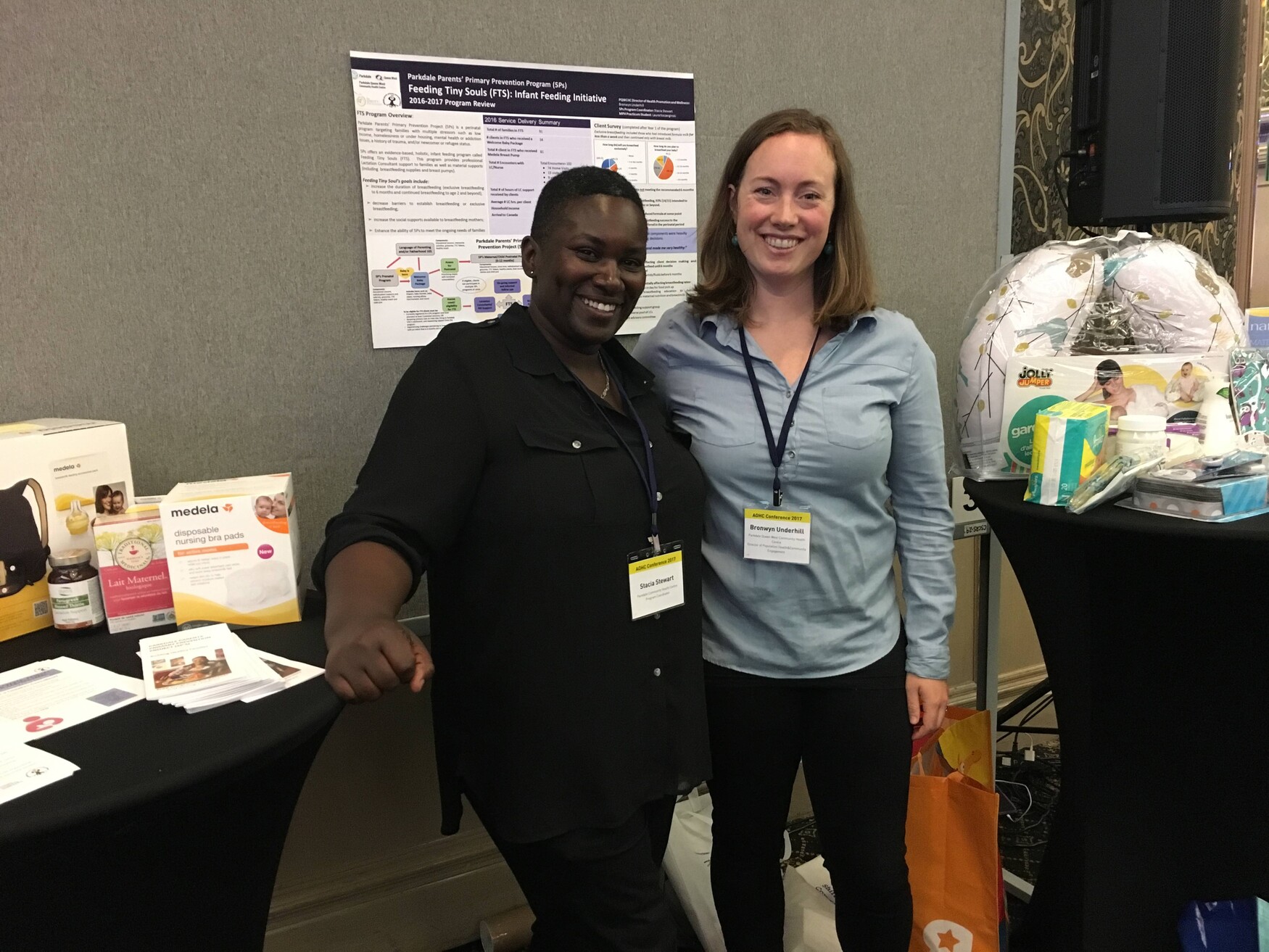Measuring the Impact of a Breastfeeding Support Program

Graciela [not her real name] gave up breastfeeding her first babies soon after they were born. She was stressed, eating poorly and wasn’t producing enough milk. This year she became a new mom again, but her four-month-old boy breastfeeds exclusively.
What changed between births? Mainly community support.
Graciela still faces some of the challenges she had when she first gave birth — she is a single mom with a low income who struggles to afford food — and recently she had anxiety that often kept her indoors.
But her experience as a parent, and with breastfeeding, has been transformed by the infant feeding program at a community health centre in Toronto. The program offers a newborn care package, weekly breastfeeding circles and healthy groceries, a high-quality breast pump and an in-home lactation consultant.
“I almost gave up breastfeeding again,” says Graciela, whose postnatal recovery was complicated by an emergency C-section. “But [the lactation consultant] gave me so many tips, like how to empty your breasts so they make more milk, and she called and texted me every day. I bought formula but didn't use it.”
The infant feeding program Graciela accessed is run by Parkdale Queen West Community Health Centre, designed to support breastfeeding and infant nutrition among mothers who often have barriers to feeding their babies: youth, newcomers, the socially isolated, and those living in poverty and with complex mental health conditions. But the centre’s staff wanted to systematically evaluate why and how well the program works, and to gauge its impact on breastfeeding rates.
Enter a new partnership between community health providers and University of Toronto researchers.
The PINSTEP Study
Professors Deborah O'Connor and Daniel Sellen from the Department of Nutritional Sciences are leading a study called PINSTEP (Parkdale Infant Nutrition Security Targeted Evaluation Project) that will provide up-to-date insights about the needs of women who use the program, what they like and don’t like about it, and what influences their choices in how they feed their infants.
“Families love this program, and I've seen a big increase in breastfeeding,” says Stacia Stewart, a program coordinator with Parkdale Queen West who has been in that role for over five years. “But I want to know how to replicate it from scratch somewhere else. That knowledge could have huge implications for women who are marginalized in Canada.”
Ninety per cent of mothers in Canada initiate breastfeeding, but only about a quarter still breastfeed exclusively at six months — despite strong evidence of its health benefits for infants. The numbers for marginalized women are not known.
A key step is to get feedback from women who use community-based breastfeeding programs. Jane Francis is a doctoral student supervised by O'Connor and Sellen, who has done focus groups and one-on-one interviews with more than 50 such women in Toronto.
"We’re hearing about what’s working and why," says Francis. "Can women easily access the program in terms of centre hours and transportation? Do they need a double electric breast pump or might a less expensive model work? How many women are breastfeeding exclusively at six months?"
Well-researched answers to those questions will help community partners develop tailored interventions, which the PINSTEP team will test in the study’s second phase.
Growing a Good Program
Alison Mildon is another doctoral student studying with Sellen and O'Connor. With data from PINSTEP’s first phase, she will work with other maternal support programs to help them design and deliver customized programs for their clients, then compare infant feeding practices of women who use particular program components with those who don’t use them.
"Because we'll have pre- and post-implementation data, we should get a clear picture of client engagement and how well the program works," says Mildon. The goal is to give governments and policy makers a clear sense of the program’s value.
"There is a growing role for professionals and programs that can help all women feed their babies, in part because many of us now enter parenthood without knowledge of how to breastfeed,” says Mildon. "And that's especially true in vulnerable populations, where new mothers already face additional stresses.”
Longer term, PINSTEP could provide a basis for measuring the wider social impact of breastfeeding support programs. Such studies would help test predictions that overall, these programs lower health care costs and ease later demands on the health system. Strong evidence suggests that breastfeeding provides infants with a rich source of the nutrients they need, protection against many infectious diseases and a lower risk for obesity and chronic disease later in life — in addition to health benefits for women themselves.
Mildon says that while public health campaigns in Canada have clearly emphasized the benefits of breastfeeding, we’ve fallen down on implementation. “Our messaging has not always been honest about the difficulties of having a newborn and breastfeeding, and many women feel guilty when things go wrong,” she says. “But it doesn’t have to be that way. We need better information and readily accessible supports.”
Funding for the PINSTEP study is provided by the Sprott Foundation and U of T’s Joannah & Brian Lawson Centre for Child Nutrition. Parkdale Queen West Community Health Centre’s infant feeding program is funded by the Sprott Foundation and their prenatal programs are funded by the Public Health Agency of Canada.
News



